South China Sea arbitration: Faces behind the Philippines's case
MANILA, Philippines (UPDATED July 23, 2016) — The ruling on the case of the Philippines against China over its extensive claims on the South China Sea has been handed down. Who defended the Philippines's claims and who decided on the fate of the West Philippine Sea? Here are the personalities behind the proceedings and arbitration.
RELATED: The verdict: Philippines wins arbitration case vs China
FULL TEXT: Permanent Court of Arbitration ruling on Philippines case vs China
The Philippine legal team
Solicitor General Florin Hilbay
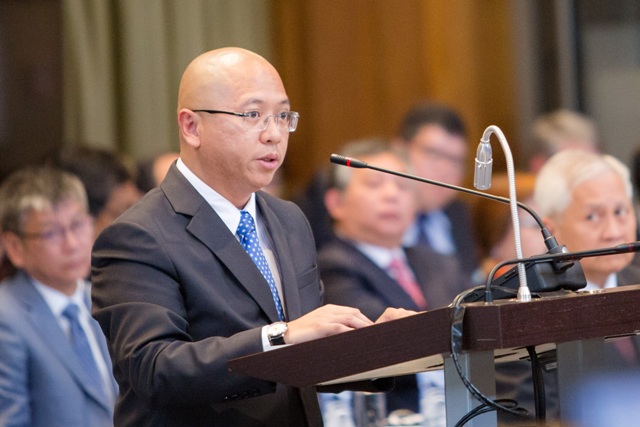
As the main agent in the case filed in 2013, Hilbay's first challenge was to convince the tribunal that it has jurisdiction under the United Nations Convention on the Law of the Sea (UNCLOS) to hear the sea, not land dispute.
At the merits hearing last year, Hilbay's task was to introduce the Philippines's presentation and sum up the country's 15 arguments against Chinese claims.
Paul Reichler
With extensive experience representing sovereign states before international courts, Reichler told the Wall Street Journal in 2013 that he and his colleagues in Washington-based law firm Foley Hoag LLC chose to risk offending Beijing and represent Manila to "fight for justice."
Reichler's responsibility at the merits hearing was to describe the nature of China's nine-dash line claim and demonstrate that China is "claiming the exclusive right to the living and non-living resources beyond the limits of its entitlements under the UNCLOS," as Hilbay put it.
Professor Bernard Oxman
University of Miami School of Law. The first American to be appointed to serve as judge ad hoc in both the International Court of Justice and the International Tribunal for the Law of the Sea, Oxman wrote in 2014 that artificial islands are not likely to extend the baseline of a state under the law.
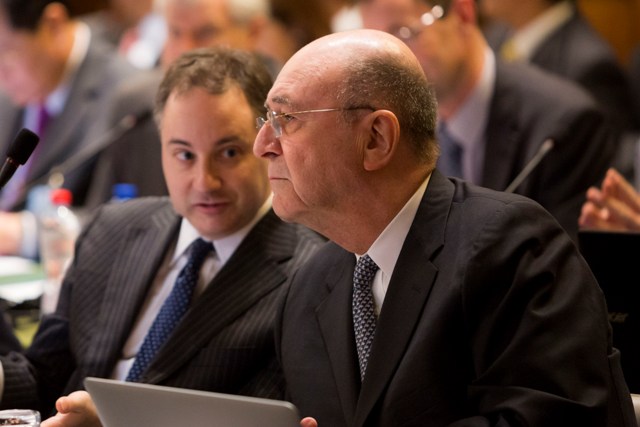
On Nov. 26, 2016, Oxman presented at the merits hearing how China aggravated and extended the maritime dispute with its actions, such as in blocking a supply mission to Filipino troops at Second Thomas Shoal, in the South China Sea.
"China's denial of access to Second Thomas Shoal forms part of a deliberate policy of physically expelling the Philippines and its nationals from disputed features and the surrounding waters. This constitutes a paradigm of aggravation and extension of the dispute," Oxman told the tribunal.
Professor Philippe Sands
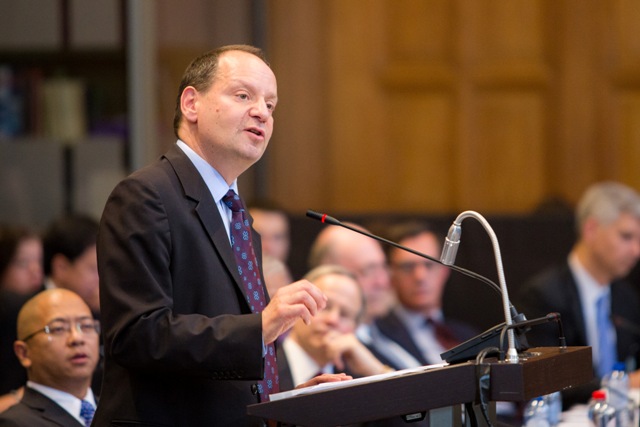
Matrix Chambers, London. A British-French public international law expert, Sands is not one to back down from the toughest opponents. In 2008, Sands accused the administration of US President George Bush of complicity in human rights violations in his book "Torture Team."
Sands told The Guardian that the sea row arbitration is "the most significant international legal case for almost the past 20 years since the Pinochet judgment," referring to Augusto Pinochet, the former Chilean leader.
At the merits hearing on Nov. 25, 2015, Sands presented the status, history, geography and hydrography of the five original low-tide elevations, which China manipulated, to argue that these cannot generate their own territorial sea under the UNCLOS.
Professor Alan Boyle
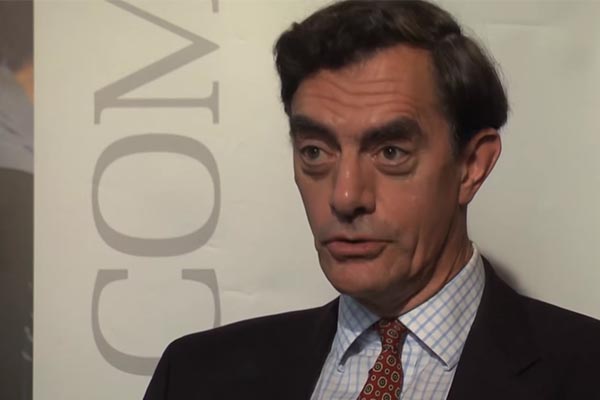
Oxford University. A specialist in environmental law, law of the sea and international litigation, Boyle appeared as counsel in six cases brought under UNCLOS. He was recently hailed by the Chambers UK Bar as "masterful" and "convincing" and showing "great learning." His research as a legal scholar includes international environmental law, law of the sea and international disputes.
At the Nov. 26, 2015 merits hearing, Boyle put forward statements on how China breached its environmental obligations under the UNCLOS.
"Our case is that China has damaged that ecosystem and, if unchecked, its activities will continue to pose a significant threat to the marine environment of the South China Sea," Boyle said.
Former Foreign Affairs Secretary Albert del Rosario
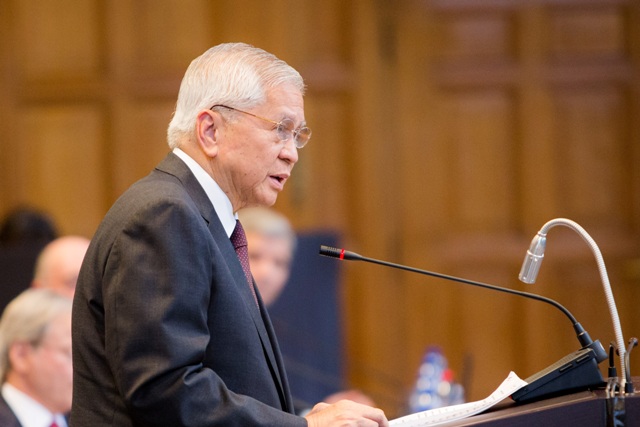
The Philippines's soft-spoken top diplomat spoke on the reason for the filing of the country's case before the tribunal. Del Rosario, whose address was described as an "impassioned plea," argued that the Philippines follows UNCLOS and rejects historical claims by China.
In his concluding remarks at the merits hearing on Nov. 30, 2015, Del Rosario expressed the country's hope in the arbitration proceedings by raising the red flag over "China's unilateral actions" and the "atmosphere of intimidation they have created."
Supreme Court senior Associate Justice Antonio Carpio
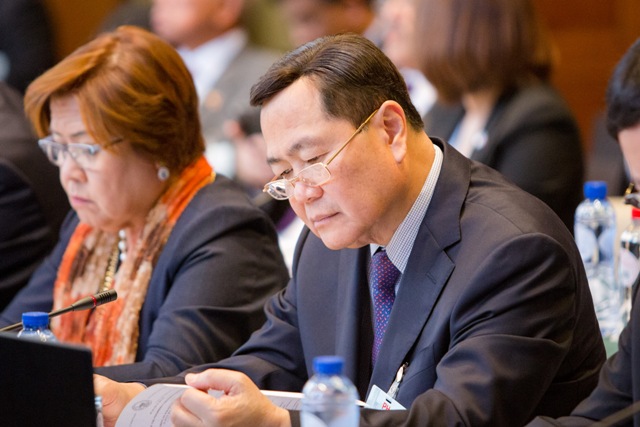
Carpio has been in speaking circles in the past couple of years to present his own research on the Philippines's own historical claims over Scarborough Shoal or Panatag.
"China's claim to a 'historical right' to the waters enclosed within the nine-dash lines in the South China Sea is utterly without basis under international law," Carpio said in March 2014 speech for the Philippine Women's Judges Association.
Supreme Court Associate Justice Francis Jardeleza
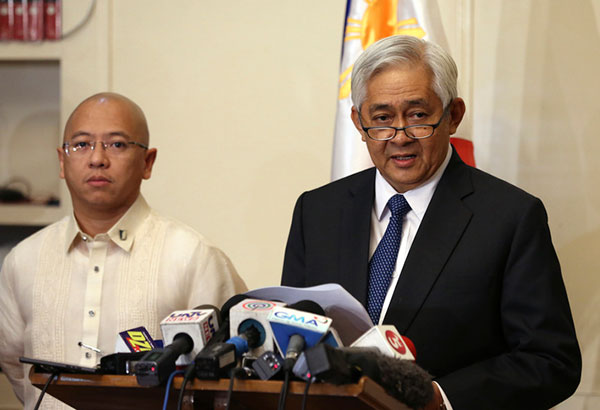
As the former solicitor general, Jardeleza, who is now Supreme Court associate justice, led the team that prepared the documents to be filed before the UNCLOS tribunal.
"The Philippines is confident that we have a strong case on all issues, including the merits in regard to all of our claims," Jardeleza said in his remarks at a Washington-based think tank in March 2014.
The arbitral tribunal
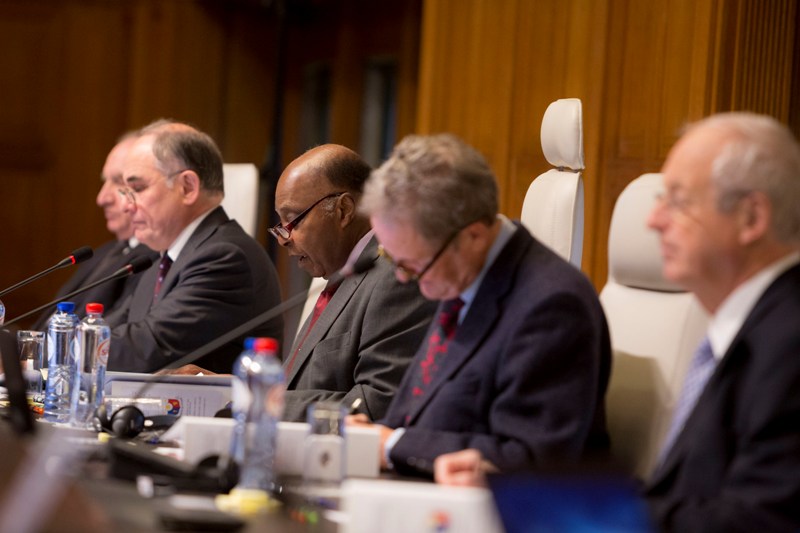
Judge Thomas Mensah (President of the tribunal)
Trained at Yale Law School, University of London and University of Ghana, Ghana-born Mensah is a respected legal mind on UNCLOS. He was appointed as president of the arbitral tribunal in June 2013 by the International Tribunal For the Law of the Sea or ITLOS. The Philippines's legal team seemed to have appealed to Mensah's specialization of environmental destruction as a violation of the UNCLOS by arguing against the extensive damage to ecosystems by China's construction activities.
Judge Jean-Pierre Cot
Geneva-born Cot is a French professor for international law and judge at the ITLOS. Having graduated from the University of Sorbonne, Cot was appointed among the last three members of the tribunal along with Alfred Soons and Chris Pinto (Pinto was thereafter replaced by Mensah). Cot has been criticized by Chinese camps for "owing the world an explanation" in deciding that the Philippines's case is under the tribunal's jurisdiction.
Judge Stanislaw Pawlak
Pawlak, a senior Polish diplomat and ITLOS judge, is well versed in the history of the US policy toward China, legal aspects of terrorism, policies in the far east and maritime law. He was appointed as the second tribunal member in March 2013.
Judge Rüdiger Wolfrum
The Philippines nominated Wolfrum, a German author of various publications on the law of the sea and public international law, to be among the arbitrators in its notification and statement of claim. China was also given 30 days to nominate an arbitrator but was adamant in its refusal to participate in the arbitration.
Professor Alfred Soons
Soons studied law at Utrecht University in the Netherlands and did his postgraduate studies in international law at the University of Washington and University of Cambridge. Chinese statements claim that Soons, along with Cot, previously expressed stance opposing the Philippines's arguments that maritime or jurisdictional claims can be decided on separately from sovereignty claims on maritime features.
---
Editor's note: In the July 23, 2016 update, an introductory sentence and a direct quote from the tribunal's jurisdictional award both under the profile of Judge Thomas Mensah have been omitted. The deletion is due to a complaint by the author of a secondary material which served as a lead to a mentioned portion of the award's text released by the Permanent Court of Arbitration. The update also adds information to the profiles the Philippines's counsels based on the July 2015 and November 2015 PCA-released transcripts of hearings to show a few of their specific contributions to the legal victory.
Photos from PCA releases; a screenshot of Professor Alan Boyle from the Graduate Institute Geneva/YouTube; a photo of Associate Justice Francis Jardeleza from the Associated Press
- Latest
- Trending




























